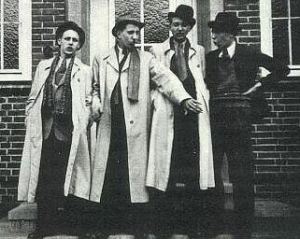Last weekend, I was tabbing through the front page headlines on the Panhandle PBS website when something caught my eye: History Detectives Special Investigations, The Disappearance of Glenn Miller. After a bit of research, I discovered HDSI has been rebranded from PBS’ long-running show History Detectives; the detectives take on longer investigations than they had previously. However, its new name was the tip of the iceberg in catching my eye because Glenn Miller is my favourite band leader of the swing era. Here, listen to this while you’re reading…
After wearing my Benny Goodman CD thin in second grade, my mother invited me into our living room one evening to watchThe Glenn Miller Story, a depiction of Miller’s life crafted in a glamourous way by Universal Pictures in 1954, because she knew I enjoyed the style of music. Jimmy Stewart, portrayer of the beloved bandleader, and June Allyson, as Helen Miller, charmed their way into my heart with a fabricated love story on the silver screen. “Pennsylvania 6-5000” quickly became my favourite tune and I was deeply haunted a by a tearful Helen at the end of the film as her husband disappeared in an aircraft on Christmas Eve, 1944. Of course, at age eight, I forgot about his untimely death (and Wikipedia wasn’t around), but I did keep a Greatest Hits CD on hand to enjoy.
Naturally, I felt compelled to watch this episode of HDSI and, with the advent of online streaming, I was able to do so! The show was informative and entertaining — largely because the investigators took the bait and investigated conspiracy theories regarding his disappearance, as well as plausible answers, and I do believe they came to an agreeable conclusion in the end. However, the most interesting portion, to me, was about “The Swing Kids” or Swingkinder. The Swing Kids lived in Germany and, like the White Rose Movement, were against The Hitler Youth. Their form of rebellion spawned from their love of Glenn Miller’s music, as he was the biggest name in swing at the time, and resistance to bans on this music deemed “degenerate” (also called Negermusik or ‘Negro music’). I am impressed the Swing Kids’ resistance, because it’s such an unusual form of defiance. Additionally, I am proud of Glenn Miller’s act of patriotism through the only medium he could use during wartime to support the troops; through his service, he demoralized the Nazi soldiers and supporters and. I find it interesting that, as an art-form, music had the ability to serve as a means to an end of one of the world’s greatest tragedies.
Needless to say, I may become a regular viewer to the mysteries of HDSI… but I also encourage you to watch this particular episode online. The investigators give thorough detail on Glenn Miller’s heartbreaking (but inspiring) story – and, hopefully, you will see the universal language of music and its profound influence on people.






